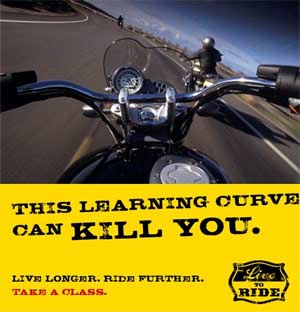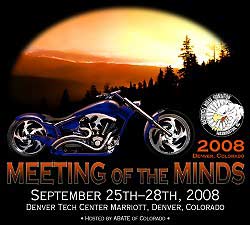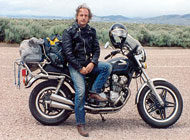Report from MotM: Is Highway Privatization a Threat to Bikers?
Friday, October 3rd, 2008 “Welcome to Colorado Interstate W-470, brought to you courtesy of the Northwest Parkway Authority.”
“Welcome to Colorado Interstate W-470, brought to you courtesy of the Northwest Parkway Authority.”
What’s that? Aren’t interstate highways owned and operated by the federal government? Well, that’s the way it used to be, but in this age of trying to reduce spending and cut budgets, more and more of the public infrastructure is being handed over on long-term leases to private, for-profit entities. The Northwest Parkway Authority is not one of these; it is in fact a creation of several local jurisdictions, but this is a variation of the same theme.
The issue is whether these private operators will have to ability to impose different restrictions than those for federally operated highways. This was one of the concerns voiced last weekend at the Motorcycle Riders Foundation‘s Meeting of the Minds here in Denver.
What might happen? Well, in Chicago, for instance, several years ago the city council passed an ordinance banning motorcycles from Lakeshore Drive after a certain hour of the night. The issue was excessive noise from bikes disturbing the folks living nearby. The problem was that that stretch of Lakeshore Drive is a U.S. highway, and federal law prohibits the kind of restriction Chicago wanted to impose. The ordinance was overturned.
But what if Lakeshore Drive were operated by a for-profit “Lakeshore Drive Agency”? Would they have gotten away with it?
There really isn’t a clear answer but that’s what the MRF is concerned about. They want to make sure that there is a clear answer enacted into law, and that that clear answer holds that federal policies DO apply and cannot be ignored. It takes relationship building with legislators and congressmen, lobbying, and a lot of behind-the-scenes hard work.
Just figured you needed to know.
Biker Quote for Today
The battle for bikers’ rights is not about patches, parties, or poker runs. We fight to protect the freedom and promote the interests of American motorcyclists … to defend our right to choose our own modes of transportation, attire, and lifestyle … to deter and defy discrimination against us … and to vanquish those who violate our rights or right-of-way. — Bruce Arnold
 It seems appropriate then that when the State of Colorado set up a motorcycle rider training program they named it the
It seems appropriate then that when the State of Colorado set up a motorcycle rider training program they named it the  We all know that bad legislation that would unfairly affect motorcyclists gets introduced and sometimes passed in legislative bodies at all levels. Who should we thank when these proposals are defeated or revoked? I’ve mentioned the American Motorcyclist Association on numerous occasions, and they do a lot of work in this area. Another organization fighting for our rights is the
We all know that bad legislation that would unfairly affect motorcyclists gets introduced and sometimes passed in legislative bodies at all levels. Who should we thank when these proposals are defeated or revoked? I’ve mentioned the American Motorcyclist Association on numerous occasions, and they do a lot of work in this area. Another organization fighting for our rights is the 